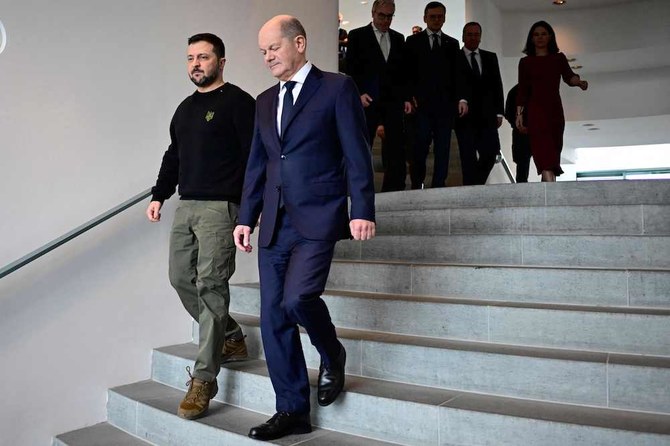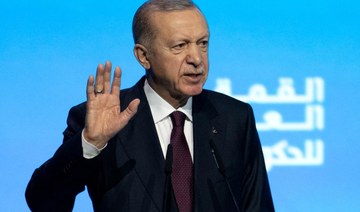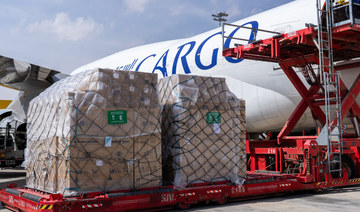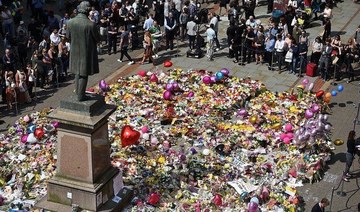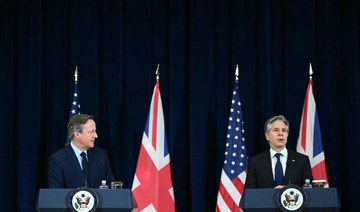MUNICH: Ukraine’s President Volodymyr Zelensky signed a security deal with Germany on Friday in Berlin, hailed by Chancellor Olaf Scholz as a “historic step” anchoring support for Kyiv in its raging battle against Russia.
Zelensky will also seal a similar deal with France later on Friday as he seeks to shore up help for his forces, who are struggling to hold off Russian attacks on the frontline city of Avdiivka.
With the Ukraine war about to enter a third year, the president was set to make a new plea for sustained help with financing and armaments at the Munich Security Conference, where leaders like US Vice President Kamala Harris have gathered.
Zelensky’s European tour comes at a critical time with Ukraine facing mounting pressure on the eastern front lines because of ammunition shortages and fresh Russian attacks.
Fierce fighting raged around beleaguered Avdiivka, on the eastern front line, which has become a main Russian target ahead of the February 24 invasion anniversary.
The long-term future of billions of dollars of Western aid is meanwhile in doubt, with the biggest contributor, the United States, in the throes of an election year.
A possible $60-billion package of military aid has been held up in Washington since last year because of wrangling in Congress.
The EU has also admitted that it will only be able to make good on half of the one million artillery shells it promised to send by March.
But Scholz underlined that the security pact inked on Friday illustrates that Germany will “not let up” in supporting Ukraine. He also announced a new package of immediate military support worth 1.1 billion euros ($1.2 billion).
“This document ... shows that Germany will continue to help Ukraine with its defense against Russia’s attacks. I have often said: for as long as it takes,” said Scholz, who also called the signing of the deal “a historic step.”
The agreement lays out support for a post-war Ukraine to build up a modern army that can repel further attacks from Russia in the future.
“Our security agreement is a truly unprecedented bilateral document,” said Zelensky.
The French presidency confirmed that a security agreement would be signed on Friday evening, but did not provide any specifics on its content.
G7 nations flagged plans to provide Ukraine with long-term defense support on the sidelines of the NATO summit last July. Alliance leaders failed, however, to set a timetable for Ukraine to join the bloc.
A first agreement had been signed with Britain in January, during Prime Minister Rishi Sunak’s visit to Kyiv.
Zelensky is seeking to shake off any war fatigue besetting his allies.
Addressing the conference in Munich, Harris said President Joe Biden’s administration “will work to secure critical weapons and resources that Ukraine so badly needs.”
Abandoning Kyiv would be a “gift to (Russian President) Vladimir Putin,“” she said, on the eve of bilateral talks with Zelensky.
Ukraine was once the main conflict on the minds of world leaders but Israel’s war with Hamas and the ensuing escalating crisis in the Middle East now also require urgent attention.
Both conflicts dominate the Munich conference, on and off stage.
Israel’s President Issac Herzog, Palestinian prime minister Mohammed Shtayyeh and Jordan’s King Abdullah II count among 180 dignitaries at the conference.
The US and a small group of Middle Eastern nations could use the opportunity to float their ideas for long-term peace between Israel and the Palestinians with European counterparts on the sidelines, the Washington Post reported on Thursday.
Mediators are also currently racing to secure a truce on the ground and the release of hostages before Israel proceeds with a full-scale ground incursion into the Gaza Strip’s far-southern city of Rafah, where more than 1.4 million Palestinians are trapped.
Roughly 130 hostages are still believed to be in Gaza following the October 7 attack on Israel by Hamas militants, which resulted in the deaths of about 1,160 people, mostly civilians, according to an AFP tally based on official Israeli figures.
At least 28,775 people, mostly women and children, have been killed in Israel’s assault on the Palestinian territory, according to the Hamas-run health ministry.



